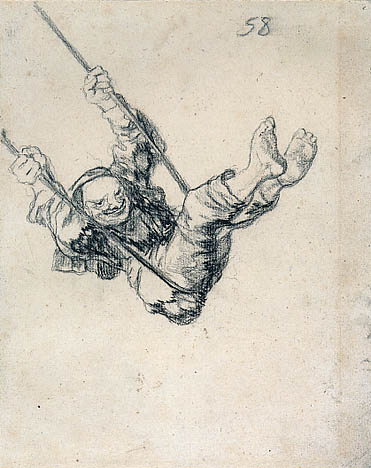"Skunk Hour"
For Elizabeth Bishop
Nautilus Island's hermit
heiress still lives through winter in her Spartan cottage;
her sheep still graze above the sea.
Her son's a bishop. Her farmer
is first selectman in our village;
she's in her dotage.
Thirsting for
the hierarchic privacy
of Queen Victoria's century,
she buys up all
the eyesores facing her shore,
and lets them fall.
The season's ill--
we've lost our summer millionaire,
who seemed to leap from an L. L. Bean
catalogue. His nine-knot yawl
was auctioned off to lobstermen.
A red fox stain covers Blue Hill.
And now our fairy
decorator brightens his shop for fall;
his fishnet's filled with orange cork,
orange, his cobbler's bench and awl;
there is no money in his work,
he'd rather marry.
One dark night,
my Tudor Ford climbed the hill's skull;
I watched for love-cars. Lights turned down,
they lay together, hull to hull,
where the graveyard shelves on the town. . . .
My mind's not right.
A car radio bleats,
"Love, O careless Love. . . ." I hear
my ill-spirit sob in each blood cell,
as if my hand were at its throat. . . .
I myself am hell;
nobody's here--
only skunks, that search
in the moonlight for a bite to eat.
They march on their soles up Main Street:
white stripes, moonstruck eyes' red fire
under the chalk-dry and spar spire
of the Trinitarian Church.
I stand on top
of our back steps and breathe the rich air--
a mother skunk with her column of kittens swills the garbage pail.
She jabs her wedge-head in a cup
of sour cream, drops her ostrich tail,
and will not scare.
-Robert Lowell
"The Armadillo"
For Robert Lowell
This is the time of year
when almost every night
the frail, illegal fire balloons appear.
Climbing the mountain height,
rising toward a saint
still honored in these parts,
the paper chambers flush and fill with light
that comes and goes, like hearts.
Once up against the sky it's hard
to tell them from the stars --
planets, that is -- the tinted ones:
Venus going down, or Mars,
or the pale green one. With a wind,
they flare and falter, wobble and toss;
but if it's still they steer between
the kite sticks of the Southern Cross,
receding, dwindling, solemnly
and steadily forsaking us,
or, in the downdraft from a peak,
suddenly turning dangerous.
Last night another big one fell.
It splattered like an egg of fire
against the cliff behind the house.
The flame ran down. We saw the pair
of owls who nest there flying up
and up, their whirling black-and-white
stained bright pink underneath, until
they shrieked up out of sight.
The ancient owls' nest must have burned.
Hastily, all alone,
a glistening armadillo left the scene,
rose-flecked, head down, tail down,
and then a baby rabbit jumped out,
short-eared, to our surprise.
So soft! -- a handful of intangible ash
with fixed, ignited eyes.
Too pretty, dreamlike mimicry!
O falling fire and piercing cry
and panic, and a weak mailed fist
clenched ignorant against the sky! -Elizabeth Bishop

